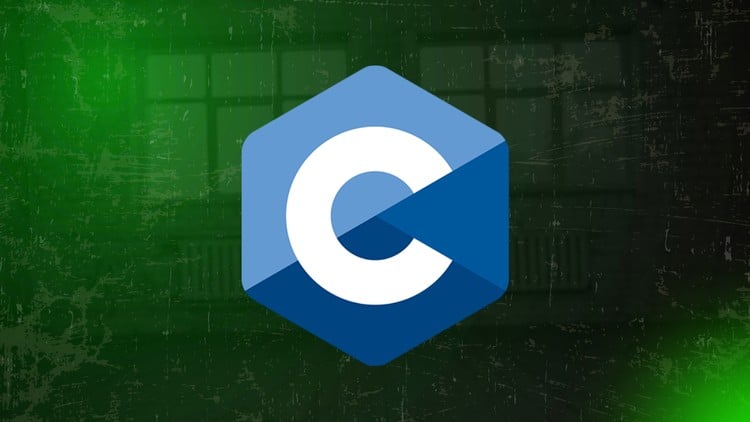
Master Variables, Pointers, Control Structures, And More To Become A Proficient C Programmer.
⏱️ Length: 2.6 total hours
👥 78 students
Add-On Information:
Note➛ Make sure your 𝐔𝐝𝐞𝐦𝐲 cart has only this course you're going to enroll it now, Remove all other courses from the 𝐔𝐝𝐞𝐦𝐲 cart before Enrolling!
- Course Overview
- Embark on a transformative journey into the heart of programming with the ‘C Programming Masterclass’. This course is meticulously crafted to be your definitive starting point in the world of software development.
- Uncover the enduring power and versatility of C, the bedrock language for operating systems, embedded systems, high-performance computing, and game development.
- Beyond just syntax, this masterclass delves into the foundational principles that empower you to write efficient, robust, and scalable code, providing a deep understanding of how computers execute instructions.
- Whether your ambition is to build systems from the ground up, optimize performance-critical applications, or simply gain a profound insight into computer architecture, C is the essential stepping stone, and this course is your comprehensive guide.
- It’s not just about learning a language; it’s about cultivating a programmer’s mindset for logical problem-solving and structured design.
- Requirements / Prerequisites
- No prior programming experience is necessary: This course is designed for absolute beginners eager to dive into programming.
- Basic computer literacy: Familiarity with navigating a computer operating system, using web browsers, and managing files is helpful.
- A computer with internet access: You’ll need a desktop or laptop to install development tools and practice coding exercises.
- A strong desire to learn and practice: Dedication to hands-on coding is key to mastering C programming concepts.
- Skills Covered / Tools Used
- Core Logic Development: Cultivate a structured approach to problem-solving, translating real-world challenges into programmatic solutions.
- Memory Management Fundamentals: Gain essential insights into how your programs interact with computer memory, preparing you for efficient resource allocation.
- Pointer Arithmetic and Dereferencing: Master direct memory manipulation techniques, crucial for advanced data structures, dynamic arrays, and system-level programming.
- Abstract Data Representation: Understand how to model and represent complex information using C’s fundamental and derived data types, going beyond simple values.
- Algorithmic Control Flow: Design intricate program pathways using conditional branching and iterative constructs to automate decisions and repetitive tasks.
- Modular Program Design: Learn to decompose large, complex problems into smaller, manageable, and reusable functions, enhancing code maintainability and team collaboration.
- Efficient Input/Output Handling: Implement robust methods for user interaction, data entry, and displaying processed results, ensuring clear communication between program and user.
- Low-Level System Interaction: Grasp the principles behind how C programs interface directly with operating system services and underlying hardware, offering a powerful advantage in system-level development.
- Debugging and Problem Isolation: Develop systematic strategies to identify, locate, and rectify errors within your C code, significantly improving program reliability and your troubleshooting skills.
- Development Environment Proficiency: Become adept at setting up, configuring, and utilizing an Integrated Development Environment (IDE) or command-line compiler (like GCC) to write, compile, and execute your C projects efficiently.
- Code Optimization Principles: Acquire foundational knowledge for writing cleaner, more performant C code by understanding compiler interactions and resource utilization.
- Foundational Data Structure Building Blocks: Understand how to construct fundamental data organizations like arrays and begin to conceptualize more complex structures, laying the groundwork for advanced algorithms.
- Compiler Interaction Workflow: Learn the entire lifecycle from source code writing through compilation, linking, and execution, demystifying the process of creating runnable programs.
- Benefits / Outcomes
- Solid Programming Foundation: Emerge with a robust understanding of programming paradigms and logic, directly transferable to learning other languages like C++, Java, Python, or Go.
- Enhanced Problem-Solving Acumen: Develop a highly structured and analytical approach to breaking down and solving complex computational challenges.
- Gateway to Advanced Fields: Be well-prepared for entry into specialized domains such as systems programming, embedded development, operating system design, game engine creation, or performance-critical application development.
- Proficiency in C Syntax & Semantics: Gain the confidence to independently write, debug, and maintain efficient C programs for various applications.
- Deeper Understanding of Computer Architecture: Acquire a profound appreciation for how software truly interacts with hardware at a fundamental level.
- Code Efficiency & Performance Awareness: Cultivate the ability to write optimized code and understand the tangible impact of design choices on program performance.
- Confidence in Tackling Complex Projects: Build the self-assurance and technical skills needed to embark on more challenging programming endeavors and personal projects.
- Mastery of Pointers and Memory: Achieve a critical skill in C programming — the ability to effectively manage memory through pointers, opening doors to highly efficient code and complex data structures.
- Career Advancement Potential: Position yourself advantageously for roles requiring strong foundational programming skills and an understanding of low-level system interactions.
- PROS
- Comprehensive Fundamentals: Provides a thorough and essential grounding in core C programming concepts.
- Practical Approach: Emphasizes hands-on coding, development environment setup, and real-world application of concepts.
- Beginner-Friendly: Structured to guide absolute newcomers through potentially complex topics with clarity.
- Efficient Learning Curve: Designed for concise delivery, allowing learners to grasp fundamental principles quickly.
- CONS
- Time Constraint for Depth: Given the course length, some advanced topics might only be introduced rather than explored in exhaustive practical depth.
Learning Tracks: English,Development,Programming Languages
Found It Free? Share It Fast!